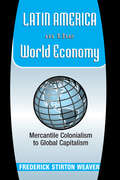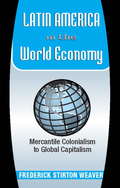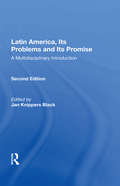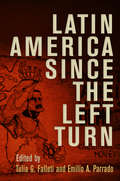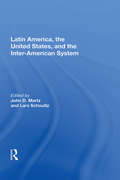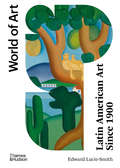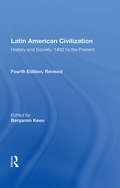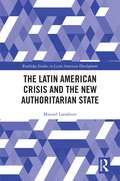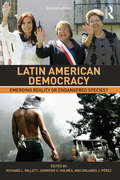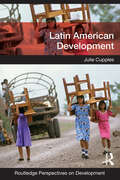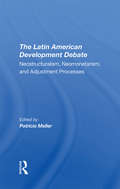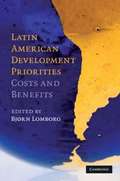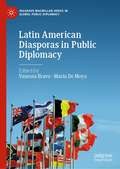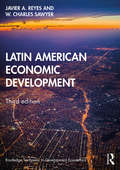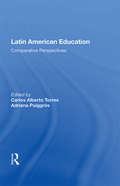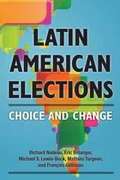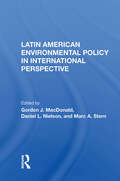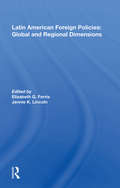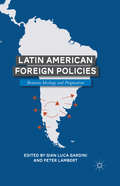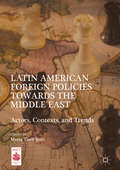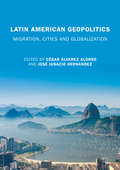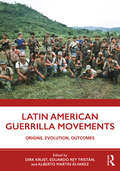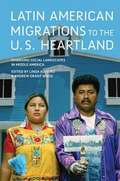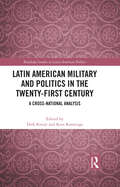- Table View
- List View
Latin America In The World Economy: Mercantile Colonialism To Global Capitalism (Latin American Perspectives Ser.)
by Frederick WeaverThis text considers the dual aspect of Latin American development: how external factors (phases of world capitalism since Columbus) interweave with internal factors (Latin American culture, politics, and social groups). Within his approach, Weaver demonstrates how domestic social conflicts and power relations have consistently capitalized on changes in the international economy, while, conversely, engagement with the international economy has consistently constrained local struggles and patterns of change.
Latin America In The World Economy
by Frederick Stirton WeaverLatin America in the World Economy considers the dual aspect of Latin American development: how external factors (phases of world capitalism since Columbus) interweave with internal factors (Latin American culture, politics, and social groups). Within his skillful approach, Weaver demonstrates how domestic social conflicts and power relations have consistently capitalized on changes in the international economy, while, conversely, engagement with the international economy has consistently constrained local struggles and patterns of change. With over half of the book dedicated to the "short" twentieth century (after 1930), Latin America in the World Economy is appropriate for courses in Latin American economic history, political economy, and development.
Latin America, Its Problems And Its Promise: A Multidisciplinary Introduction, Second Edition
by Jan Knippers BlackThis textbook, extensively revised and updated in this new second edition, introduces the student to what is most basic and most interesting about Latin America. The authors-each widely recognized in his or her own discipline, as well as among Latin Americanists-analyze both the enduring features of the area and the pace and direction of change. Th
Latin America Since the Left Turn (Democracy, Citizenship, and Constitutionalism)
by Tulia G. Falleti Emilio A. ParradoIn the early twenty-first century, the citizens of many Latin American countries, such as Argentina, Bolivia, Brazil, Ecuador, and Venezuela, elected left-wing governments, explicitly rejecting and attempting to reverse the policies of neoliberal structural economic adjustment that had prevailed in the region during the 1990s. However, in other countries such as Chile, Colombia, Mexico, and Peru continuity and even extension of the neoliberal agenda have been the norm.What were the consequences of rejecting the neoliberal consensus in Latin America? Why did some countries stay on the neoliberal course? Contributors to Latin America Since the Left Turn address these questions and more as they frame the tensions and contradictions that currently characterize Latin American societies and politics. Divided into three sections, the book begins with an examination of the political economy, from models of development, to taxation and spending patterns, to regionalization of trade and human migration. The second section analyzes the changes in democracy and political identities. The last part explores the themes of citizenship, constitutionalism, and new forms of civic participation. With essays by the foremost scholars in the field, Latin America Since the Left Turn not only delves into the cases of specific countries but also surveys the region as a whole.Contributors: Isabella Alcañiz, Sandra Botero, Marcella Cerrutti, George Ciccariello-Maher, Tula G. Falleti, Roberto Gargarella, Adrian Gurza Lavalle, Juliet Hooker, Evelyne Huber, Ernesto Isunza Vera, Nora Lustig, Paulina Ochoa Espejo, Emilio A. Parrado, Claudiney Pereira, Thamy Pogrebinschi, Irina Carlota Silber, David Smilde, John D. Stephens, Maristella Svampa, Oscar Vega Camacho, Gisela Zaremberg.
Latin America, The United States, And The Interamerican System
by Lars Schoultz John D. MartzThis collection of original essays focuses on the dynamics of the contemporary system of inter-American relations, with emphasis on changes in the hemispheric political economy, the control exercised by the United States over the behavior of Latin American governments, and the issue of human rights. The authors discuss varying facets of the complex
Latin American Art Since 1900 (World of Art #0)
by Edward Lucie-SmithAn extraordinary synthesis of more than a century’s worth of art across Central and South America, Latin American Art Since 1900 covers everyone from popular figures such as Diego Rivera and Frida Kahlo, to a wide range of other artists who are less well-known outside Latin America. In this classic survey, now updated with full-color images throughout, Edward Lucie-Smith introduces the art of Latin America from 1900 to the present day. Lucie-Smith examines major artists such as Diego Rivera and Frida Kahlo, as well as dozens of less familiar Latin American artists and exiled artists from Europe and the United States who spent their lives in South America, such as Leonora Carrington. The author explains the political context for artistic development and sets the works in national, cultural, and international frameworks. Featured in this book are the artists who have searched for indigenous roots and local tradition; explored abstraction, expressionism, and new media; entered into dialogue with European and North American movements, while insisting on reaching a wide, popular audience for their work; and created an energetic, innovative, and varied art scene across the South American continent. With a new chapter that extends the discussion into the twenty-first century, a constant theme of Latin American Art Since 1960 is the embrace of the experimental and the new by artists across Latin America.
Latin American Civilization: History And Society, 1492 To The Present-- Fourth Edition
by Benjamin KeenThe fourth edition of Latin American Civilization is a compact update of a classic book of readings that teachers and students of Latin American history have used and appreciated since its first appearance in 1955. Returning to the single-volume format, this edition combines the best of the old collection with new material on recent developments in Latin American politics and society. Particular care has been taken to bring the chapters on the twentieth century up to date. Among the new selections are pieces on the Church’s role in the Nicaraguan revolution, the Malvinas/Falklands war, the struggle for democracy in Argentina and Brazil, and women’s liberation in Cuba. The great majority of selections are primary materials. These personal narratives—many translated by Dr. Keen for this collection—convey the flavor and spirit of a period more vividly than official documents and are generally better written. Secondary works are used only when suitable contemporary material was not available. The brief introductions and headnotes, which provide students with background information on the authors and subject matter, have been updated to reflect the best recent scholarship. This lively, entertaining, and informative book is an excellent companion for all texts on Latin American history, although its organization and outlook conform most closely to that of Keen and Wasserman’s Short History of Latin America.
Latin American Constitutions
by M. c. MirowLatin American Constitutions provides a comprehensive historical study of constitutionalism in Latin America from the independence period to the present, focusing on the Constitution of Cádiz, a foundational document in Latin American constitutionalism. Although drafted in Spain, it was applied in many regions of Latin America, and deputies from America formed a significant part of the drafting body. The politicization of constitutionalism reflected in Latin America's first moments proved to be a lasting legacy evident in the legal and constitutional world of the region today: many of Latin America's present challenges to establishing effective constitutionalism can be traced to the debates, ideas, structures, and assumptions of this text. This book explores the region's attempts to create effective constitutional texts and regimes in light of an established practice of linking constitutions to political goals and places important constitutional thinkers and regional constitutions, such as the Mexican Constitution of 1917, into their legal and historical context.
The Latin American Crisis and the New Authoritarian State (Routledge Studies in Latin American Development)
by Manuel LarrabureThis book provides a fresh interpretation of the rise and fall of Latin America’s ‘left turn’, or movement towards more progressive economic or social policies. From a historical and comparative perspective, the book argues that Latin America is entering a new phase of authoritarian statism. Based on over 10 years of research on Latin American political economy and social movements, including years of fieldwork in Chile, Brazil, Venezuela and Argentina, this book combines the stories of individuals and groups in particular situations with the macro-level political and economic trajectory of the region since the postwar period. The book draws on over 100 interviews with community activists, workers, union leaders, politicians, journalists, and NGOs, as well as archival work. In addition, the book uses up-to-date national and regional economic data, including both standard and heterodox development indicators. By engaging with key case studies including Argentina’s recovered enterprises, Chile’s student movement, Brazil’s free transit movement, and Venezuela’s popular economy, this book analyzes the complex relationship between "post-capitalist struggles" and the governance models of the "pink tide", the wave of left governments that began to sweep the region at the turn of the century. This book will be of interest to researchers across politics, development, Latin American studies and social movement studies. The original data and analysis of the relationship between social movements and governments will also benefit policymakers and those working within the NGO sector.
Latin American Democracy: Emerging Reality or Endangered Species?
by Richard L. Millett Jennifer S. Holmes Orlando J. PérezMore than thirty years have passed since Latin America began the arduous task of transitioning from military-led rule to democracy. In this time, more countries have moved toward the institutional bases of democracy than at any time in the region’s history. Nearly all countries have held free, competitive elections and most have had peaceful alternations in power between opposing political forces. Despite these advances, however, Latin American countries continue to face serious domestic and international challenges to the consolidation of stable democratic governance. The challenges range from weak political institutions, corruption, legacies of militarism, transnational crime, and globalization among others. In the second edition of Latin American Democracy contributors – both academics and practitioners, North Americans, Latin Americans, and Spaniards—explore and assess the state of democratic consolidation in Latin America by focusing on the specific issues and challenges confronting democratic governance in the region. This thoroughly updated revision provides new chapters on: the environment, decentralization, the economy, indigenous groups, and the role of China in the region.
Latin American Development (Routledge Perspectives on Development)
by Julie CupplesLatin America’s diverse political and economic struggles and triumphs have captured the global imagination. The region has been a site of brutal dictators, revolutionary heroes, the Cold War struggle and as a place in which the global debt crisis has had some of its most lasting and devastating impacts. Latin America continues to undergo rapid transformation, demonstrating both inspirational change and frustrating continuities. This text provides a comprehensive introduction to Latin American development in the twenty-first century, emphasizing political, economic, social, cultural and environmental dimensions of development. It considers key challenges facing the region and the diverse ways in which its people are responding, as well as providing analysis of the ways in which such challenges and responses can be theorized. This book also explores the region’s historical trajectory, the implementation and rejection of the neoliberal model and the role played by diverse social movements. Relations of gender, class and race are considered, as well as the ways in which media and popular culture are forging new global imaginaries of the continent. The text also considers the increasing difficulties that Latin America faces in confronting climate change and environmental degradation. This accessible text gives an overarching historical and geographical analysis of the region and critical analysis of recent developments. It is accompanied by a diverse range of critical historical and contemporary case studies from all parts of the continent, providing readers with the conceptual tools required to analyse theories on Latin American development. Each chapter ends with a summary section, discussion topics, suggestions for further reading, websites and media resources. This is an indispensable resource for scholars, students and practitioners.
The Latin American Development Debate: Neostructuralism, Neomonetarism, And Adjustment Processes
by Patricio MellerIn the 1980s Latin America experienced its second worst economic crisis of the century; today the average per capita income is about 10 percent less than a decade ago. Because the crisis affected all Latin American countries regardless of their economic policies, the period has become known as "the lost decade in Latin America." In this book, eminent economists from the region reexamine strategies of development—structuralism versus monetarism, liberalism versus statism, growth versus equity—in light of new theoretical knowledge and recent economic events. The essays offer a complex interpretation of development problems and seek to explain how different schools of thought could be compatible and how old debates must be recast in the light of structural changes in Latin American economies. In addition, contributors critically review the adjustment processes applied in various countries. Together the chapters offer a penetrating analysis of what went wrong in Latin America in the 1980s and a careful assessment of economic measures and policies that might prove viable in promoting stable and growing economies, democratic regimes, and social justice.
Latin American Development Priorities: Costs and Benefits
by Bjørn LomborgMany countries in Latin America and the Caribbean have achieved considerable economic growth, yet the region still faces many seemingly intractable problems. The conventional wisdom in development agencies - that prioritization is impossible and that everything must be done - is simply not effective. Latin American Development Priorities shows how limited resources could be used for the greatest benefit of the Latin American and Caribbean region. A panel of economists met over three days in San José to review proposals to tackle the ten most important challenges, which emerged from a survey by the Inter-American Development Bank. The expert panel was asked a question which appears simple but is actually very difficult to answer: What should Latin American governments do with an additional nominal $10 billion? Hard choices are needed if Latin America's problems are to be tackled effectively. This book provides the means to make those choices as objectively as possible.
Latin American Diasporas in Public Diplomacy (Palgrave Macmillan Series in Global Public Diplomacy)
by Vanessa Bravo Maria De MoyaThis book on Latin American Diasporas in Public Diplomacy explains and illustrates, through case studies, the different strategic roles that diaspora groups play in modern public diplomacy efforts. These are categorized by being participatory, having a strong involvement of non-state actors, involving frequent partnerships, and placing an increased focus on global issues. In particular, this book provides, in its 13 chapters, the perspective of Latin American diasporas and nations, which are severely underrepresented in the public diplomacy literature. Additionally, because it is written from a strategic communication perspective, this book provides insight into a variety of public diplomacy approaches employed by modern-day diasporas from Latin America. It also describes some examples of diaspora-targeted, state-led public diplomacy efforts in the region. Taking a regional focus to the exploration of diasporas in public diplomacy, this edited book facilitates cross-country comparisons and the understanding of the phenomena beyond the country-specific cases.
Latin American Economic Development (Routledge Textbooks in Development Economics)
by Javier A. Reyes W. Charles SawyerLatin America is one of the most intriguing parts of the world. The region’s illustrious history, culture, and geography are famous internationally, but in terms of economics, Latin America has been generally associated with problems. For many, the combination of a resource-rich region and poor economic conditions has been a puzzle.This extensively revised and updated third edition of Latin American Economic Development continues to provide the most up-to-date exploration of why the continent can be considered to have underperformed, how the various Latin American economies function, and the future prospects for the region. The book addresses the economic problems of Latin America theme by theme.Changes and new features in this new edition include: • a new chapter on economic growth that reflects the new understanding of slow growth in the region;• two new appendices on basic microeconomics and macroeconomics;• expanded coverage on new commodities such as lithium and quinoa;• a number of new boxes and updates to existing boxes. The book provides a comprehensive text for undergraduate economics courses on Latin America and is also suitable for use by students in other disciplines looking for a wide-ranging guide to the region. This book will continue to be an invaluable resource for undergraduates looking at Latin American economics, growth, and development.
Latin American Education: Comparative Perspectives
by Carlos Alberto Torres Adriana PuiggrósThis book offers a relevant sample of the current research on Latin American education in comparative perspective. In their introduction, Torres and Puiggros, two of the most recognized researchers of Latin American education, draw from political sociology of education, theories of the state, history of education, and deconstructionist theories to focus on changes in state formation in the region and its implications for the constitution of the pedagogical subject in public schools. Throughout the different chapters, the contributors present and analyze the most relevant topics, research agendas, and some of the key theoretical and political problems of Latin American education.
Latin American Elections: Choice and Change
by Richard Nadeau Michael S. Lewis-Beck Mathieu Turgeon Francois Gelineau Eric BelangerThe Michigan model, named after the institution where it was first articulated, has been used to explain voting behavior in North American and Western European democracies. In Latin American Elections, experts on Latin America join with experts on electoral studies to evaluate the model’s applicability in this region. Analyzing data from the AmericasBarometer, a scientific public opinion survey carried out in 18 Latin American nations from 2008 to 2012, the authors find that, like democratic voters elsewhere, Latin Americans respond to long-term forces, such as social class, political party ties, and political ideology while also paying attention to short-term issues, such as the economy, crime, corruption. Of course, Latin Americans differ from other Americans, and among themselves. Voters who have experienced left-wing populism may favor government curbs on freedom of expression, for example, while voters enduring high levels of economic deprivation or instability tend to vote against the party in power. The authors thus conclude that, to a surprising extent, the Michigan model offers a powerful explanatory model for voting behavior in Latin America.
Latin American Environmental Policy In International Perspective
by Gordon J MacdonaldStarting from the stance that environmental policy has progressed from rhetoric to substance in Latin America, the editors’ proceed through a series of papers to show why, what difference it makes, and how it compares to other parts of the world. In doing so, the book touches on domestic and international factors including political institutions, international development institutions, nongovernmental organizations, and transboundary cooperation. Latin American Environmental Policy in International Perspective is one in a series of books that take a look at Latin America in Global Perspective. Previous titles have addressed politics, gender, regional integration, institutional design, and civil/military relations.
Latin American Foreign Policies: Global And Regional Dimensions
by Elizabeth G. Ferris; Jennie K. LincolnThis collection of original essays takes a comprehensive look at Latin America's regional and global foreign policies. The book begins with an assessment of the current state of research in the field, followed by an overview of Latin American foreign policies and the political determinants of those policies. Next, an examination of the global policies of Brazil, Cuba, Mexico, and Peru demonstrates differing theoretical perspectives and provides information for cross national comparisons. The third section presents case studies of regional foreign policies in Argentina, Brazil, Chile, Bolivia, Venezuela, Mexico, Cuba, and the Anglophone Caribbean nations. In the concluding chapter, the editors review the recurring themes in the book and propose a theory for the analysis of Latin American foreign policy behavior.
Latin American Foreign Policies: Between Ideology and Pragmatism
by Gian Luca Gardini Peter LambertIn recent years several Latin American countries have adopted a more assertive and autonomous stance in their foreign policy. The growing rejection of neo-liberalism as an ideological dogma seems to have given space to more pragmatic stances in favour of national interests.
Latin American Foreign Policies towards the Middle East
by Marta Tawil KuriThis volume surveys the interplay between state and non-state actors in Latin American foreign policies and attitudes towards the Middle East in the twenty-first century. How will domestic instability and international tensions affect the choices and behavior of Latin American countries towards the Arab world? The chapters here offer insight into this and similar questions, as well as a comparative value in analyzing countries beyond those specifically discussed. Common topics in policy making are considered-namely, Israel and Palestine, Iran, the Gulf countries, and the Arab "Spring"-as authors from distinct disciplines examine the crucial relation between ends and means on the one hand, and foreign policy actions and context on the other.
Latin American Geopolitics: Migration, Cities and Globalization
by César Álvarez Alonso José Ignacio HernándezThis edited volume analyzes how migration, the conformation of urban areas, and globalization impact Latin American geopolitics. Globalization has decisively influenced Latin American nationhood and it has also helped create a global region with global cities that are the result of the urbanization process. Also, globalization and migration are changing Latin America's own vision as a collective community. This book tackles how migration triggers concerns about security, which lead to policies based on the protection of borders as a matter of national security. The contributors argue that economic regionalization-globalization promotes changes in the social and economic geography which refer to social phenomena, the dynamic of social classes and their spatial implications, all of which may impact economic growth on the region. The project will appeal to a wider audience including political scientists, scholars, researchers, students and non-academics interested in Latin American geopolitics.
Latin American Guerrilla Movements: Origins, Evolution, Outcomes
by Dirk Kruijt Eduardo Rey Tristán Alberto Martín ÁlvarezOrganized around single country studies embedded in key historical moments, this book introduces students to the shifting and varied guerrilla history of Latin America from the late 1950s to the present. It brings together academics and those directly involved in aspects of the guerrilla movement, to understand each country’s experience with guerrilla warfare and revolutionary activism. The book is divided in four thematic parts after two opening chapters that analyze the tradition of military involvement in Latin American politics and the parallel tradition of insurgency and coup effort against dictatorship. The first two parts examine active guerrilla movements in the 1960s and 1970s with case studies including Bolivia, Nicaragua, Peru, Argentina, Chile and Uruguay. Part 3 is dedicated to the Central American Civil Wars of the 1980s and 1990s in Nicaragua, El Salvador and Guatemala. Part 4 examines specific guerrilla movements which require special attention. Chapters include Colombia’s complicated guerrilla scenery; the rivalling Shining Path and Tupac Amaru guerrillas in Peru; small guerrilla movements in Mexico which were never completely documented; and transnational guerrilla operations in the Southern Cone. The concluding chapter presents a balance of the entire Latin American guerrilla at present. Superbly accessible, while retaining the complexity of Latin American politics, Latin American Guerrilla Movements represents the best historical account of revolutionary movements in the region, which students will find of great use owing to its coverage and insights.
Latin American Migrations to the U.S. Heartland: Changing Social Landscapes in Middle America
by Linda Allegro Andrew Grant WoodResponding to inaccuracies concerning Latino immigrants in the United States as well as an anti-immigrant strain in the American psyche, this collection of essays examines the movement of the Latin American labor force to the central states of Oklahoma, Kansas, Nebraska, Arkansas, Missouri, and Iowa. Contributors look at the outside factors that affect migration including corporate agriculture, technology, globalization, and government, as well as factors that have attracted Latin Americans to the Heartland including religion, strong family values, hard work, farming, and cowboy culture. Several essays also point to hostile neoliberal policy reforms that have made it difficult for Latino Americans to find social and economic stability. The varied essays in Latin American Migrations to the U.S. Heartland seek to reveal the many ways in which identities, economies, and geographies are changing as Latin Americans adjust to their new homes, jobs, and communities. Contributors are Linda Allegro, Tisa M. Anders, Scott Carter, Caitlin Didier, Miranda Cady Hallett, Edmund Hamann, Albert Iaroi, Errol D. Jones, Jane Juffer, Laszlo J. Kulcsar, Janelle Reeves, Jennifer F. Reynolds, Sandi Smith-Nonini, and Andrew Grant Wood.
Latin American Military and Politics in the Twenty-first Century: A Cross-National Analysis (Routledge Studies in Latin American Politics)
by Dirk KruijtThis volume offers a comparative analysis of the role of the military in Latin America in domestic politics and governance after 2000. Divided into four parts covering the entirety of Latin America, the book argues that the Latin American military as semi-autonomous political actors have not faded away since 2000 and may even have been making a comeback in various countries. Each part outlines scenarios which effectively frame the various pathways taken to post-military democratic society. Part 1 critically examines textbook cases of political demilitarization in the Southern Cone, Peru, and Costa Rica. Part 2 contrasts the role of the military in the post-2000 politics of two regional powers: Brazil and Mexico. Part 3 examines the political role of the military facing ‘violent pluralism’ in Colombia and the Northern triangle of Central America. Finally, Part 4 identifies country cases in which the military have been instrumental in the rise, sustenance, and occasional demise of left wing revolutionary projects within Venezuela, Cuba, Nicaragua, and Bolivia. Latin American Military and Politics in the Twenty-First Century will be of interest to scholars, students and professionals in the fields of Latin American history, international relations, military studies and studies concerning democracy, political violence and revolution in Latin America elsewhere.
